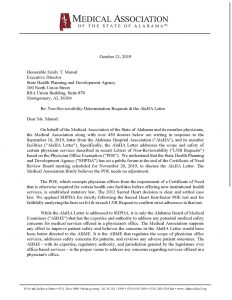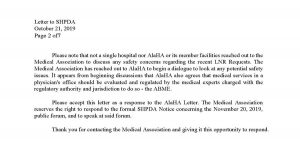Posted by Mallory Camerio on October 25, 2019

As part of its “Regulatory Sprint to Coordinated Care,” the Centers for Medicare and Medicaid Services (“CMS”) and the Health and Human Services Office of Inspector General (“OIG”) released proposals to modernize the Medicare Physician Self-Referral Law (“Stark Law”), Anti-Kickback Statute (“AKS”), and Beneficiary Inducements Civil Money Penalty (“CMP”) (collectively, the “Proposed Rules”). The Proposed Rules add five new Stark Law exceptions, seven new AKS safe harbors, and an additional exception to the definition of “remuneration” under the CMP. Several of the new Stark exceptions and AKS safe harbors relate to value-based arrangements and largely mirror each other. Other new exceptions and safe harbors relate to the donation or use of cybersecurity items and beneficiary incentives in the coordination of patient care. These proposals are by no means final (stakeholders have until December 31, 2019 to comment on them), but if finalized, they may provide more flexibility for physicians and other providers to pursue value-based arrangements, as well as greater clarity with respect to existing Stark Law requirements.
Value-Based Arrangements under Stark and AKS
Three new Stark exceptions and four new AKS safe harbors relate to value-based arrangements in which one or more participants in a value-based enterprise (“VBE”) pursue one or more value-based activities and purposes. Value-based purposes include coordinating and managing care, improving quality, reducing costs or growth of expenditures (without reducing quality), and transitioning from fee-for-service care to quality care for a target patient population. Value-based activities include providing items or services (not including a referral), taking an action, or refraining from taking an action, in furtherance of a value-based purpose.
There are separate exceptions and safe harbors for value-based arrangements involving: (i) full financial risk, (ii) meaningful/substantial downside financial risk, and (iii) remuneration for improving quality, health outcomes, and efficiency. Full financial risk means that the VBE is prospectively financially responsible for the cost of all patient care items and services covered by the applicable payor for each patient in a target patient population over a specified period of time. Meaningful/substantial financial downside risk means that a physician is responsible to the VBE for specified percentages of the value of the remuneration paid to the physician or is responsible on a prospective basis for the cost of all or a defined set of patient care items and services for each patient in the target patient population over a specified period of time. For value-based arrangements incentivizing improvements in quality, health outcomes, and efficiency, the proposed Stark exception would allow both financial and in-kind remuneration related to value-based activities and meeting objective and measurable quality and performance targets. By contrast, the similar proposed AKS safe harbors focus more on in-kind remuneration, including anything of value given either to VBE participants to help coordinate and manage patient care and patient engagement tools and supports given to patients to address social determinants of health and incentivize the patient’s participation in their health care. In addition to the mirror exceptions and safe harbors generally described above, the AKS Proposed Rule sets forth an additional safe harbor for remuneration exchanged between participants in a CMS-sponsored model, such as an ACO or bundled payment model.
There are common requirements for each of the exceptions and safe harbors listed above. For instance, the VBE must generally set forth in a signed writing the terms of the value-based arrangement, including a description of the nature and extent of the risk assumed under the arrangement, the value-based activities involved, the target patient population, and the type and cost of the remuneration involved. Additionally, the VBE or VBE participant offering remuneration under a value-based arrangement must not take into account the volume or value of referrals or otherwise condition the remuneration on referrals of patients who are not a part of the target patient population or business not covered by the value-based arrangement.
Other Stark Additions and Clarifications
The Stark Proposed Rule contains an additional exception for nominal payments to physicians ($3,500 annually, indexed for inflation) for the provision of items and services to an entity. The new exception applies even if there is no written agreement, provided the compensation does not relate to the volume or value of referrals or other business generated by the physician, does not exceed fair market value, and is commercially reasonable, among other requirements. The Stark Proposal also modifies certain existing Stark exceptions and clarifies a number of definitions. For instance, it adds flexibility to the “Electronic health records items and services” exception to include nonmonetary remuneration in the form of cybersecurity software and services. It also purports to clarify the meaning of “fair market value” and “commercially reasonable.” Although additional clarification of these terms would probably be useful, the Stark Proposed Rule at least clarifies that an arrangement does not have to result in a profit for one or more of the parties in order to be commercially reasonable.
Beneficiary Inducements
The Proposed Rules provide additional protection for remuneration to beneficiaries under AKS and the CMP. Under a new AKS safe harbor, beneficiary incentive payments to beneficiaries assigned to an Accountable Care Organization (“ACO”) under the Medicare Shared Savings Program (“MSSP”) would not constitute “remuneration” for purposes of AKS, if they meet the ACO beneficiary incentive requirements under MSSP. Somewhat similarly, the provision of telehealth technologies to patients with end-stage renal disease (“ESRD”) is not considered “remuneration” for purposes of the CMP if the technologies contribute to the provision of telehealth services related to the patient’s ESRD, is not of excessive value, and meets other requirements.
Conclusion
This article simply provides a high-level overview of the concepts addressed in the Proposed Rule. A more in-depth review of the Proposed Rules reveals additional requirements and subtle differences in the rules that will be material to parties trying to navigate them successfully. Again, these rules are far from final. However, they indicate an intentional shift toward value-based care and relaxed regulatory requirements to help foster such care. Physicians and other providers have an opportunity to provide feedback on these proposals and hopefully refine them to workable exceptions that will enable the further adoption of value-based arrangements which are being promoted by current payment policy.
Article submitted by Christopher L. Richard, Esq. with Gilpin Givhan, PC in Montgomery, AL.







